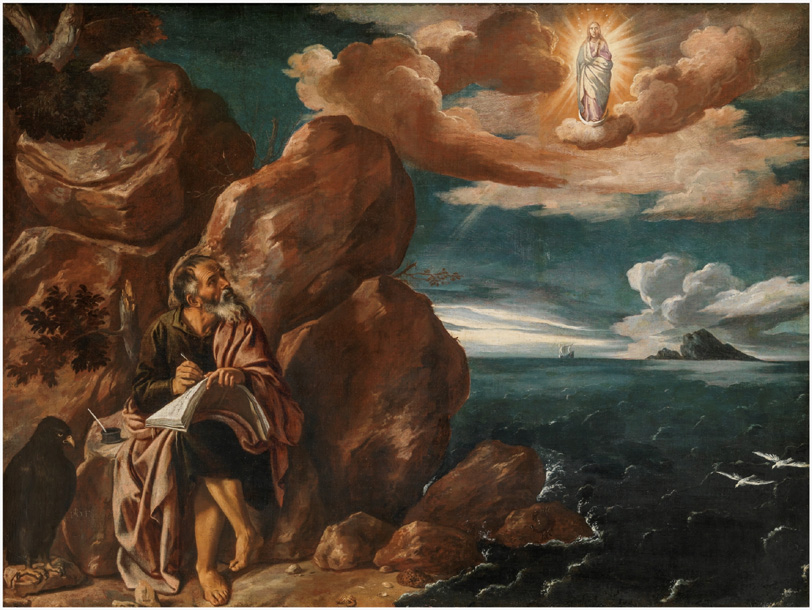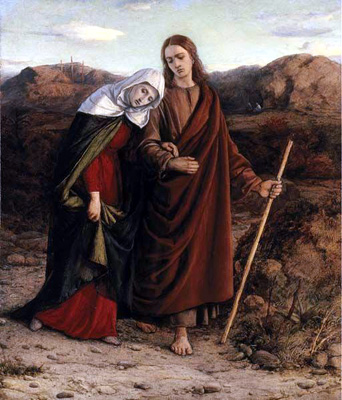 
by Rev. Leonard Goffine, 1880
John, the son of Zebedee and of Salome, and brother of St. James the Greater, born about eight years later than Christ, was the youngest of the apostles, and before being called by Christ was a fisherman, and disciple of St. John the Baptist. When Jesus called him and his brother, they were mending their nets by the sea of Galilee. He obeyed the call and became our Lord's constant companion, and was, with Peter and James, His most intimate disciple.
http://catholicharboroffaithandmorals.com/ Our Lord loved him above all the others, especially on account of his great purity of heart, and gave him the most tender proofs of His affection, so much so, that at the Last Supper St. John was permitted to lean upon the Saviour's breast; our Lord when dying, gave His beloved Mother into his care, and she was taken home by St. John, who never again left her.
When the apostles dispersed to preach the gospel in different parts of the world, St. John went to Asia Minor, where he founded many congregations, and that he might be near them, he established his seat at Ephesus. He was taken to Rome in the year 95, during the reign of the cruel Emperor Domitian, and cast into a kettle of boiling oil; by divine assistance he was preserved in a wonderful manner, but was banished by the emperor to the island of Patmos, now called Palmosa. Here he received those marvellous revelations, called the Apocalypse, which are included in the holy Scriptures, and foretell the fate of the Church of God. After the death of Domitian, St. John returned to Ephesus, where at the prayer of the faithful, and to refute the heresy which denied the divinity of Christ, he wrote his gospel, in which he soars like an eagle to the subject of Christ's divinity, and proves it indisputably against the heresies of Ebion and Cerinthus.
Our Lord loved him above all the others, especially on account of his great purity of heart, and gave him the most tender proofs of His affection, so much so, that at the Last Supper St. John was permitted to lean upon the Saviour's breast; our Lord when dying, gave His beloved Mother into his care, and she was taken home by St. John, who never again left her.
When the apostles dispersed to preach the gospel in different parts of the world, St. John went to Asia Minor, where he founded many congregations, and that he might be near them, he established his seat at Ephesus. He was taken to Rome in the year 95, during the reign of the cruel Emperor Domitian, and cast into a kettle of boiling oil; by divine assistance he was preserved in a wonderful manner, but was banished by the emperor to the island of Patmos, now called Palmosa. Here he received those marvellous revelations, called the Apocalypse, which are included in the holy Scriptures, and foretell the fate of the Church of God. After the death of Domitian, St. John returned to Ephesus, where at the prayer of the faithful, and to refute the heresy which denied the divinity of Christ, he wrote his gospel, in which he soars like an eagle to the subject of Christ's divinity, and proves it indisputably against the heresies of Ebion and Cerinthus.
About the same time he also wrote his three epistles, wherein he urges especially the love of God and our neighbor. He constantly inculcated this love especially in his old age, and when he could no longer, because of the weakness of age, deliver long sermons, he would always, when he appeared among the faithful, repeat these words: "My children, love one another," and when once asked why he said always the same thing, he replied: "This is the commandment of the Lord, and who observes this, does enough." St. John believed he could not better repay the love which Christ had shown him, than by infusing into all hearts the holy love, which is the perfect bond and the mark of the true disciple of Jesus. St. John survived all the apostles; at last, in the year 100 of our era, Christ called to Himself by a placid death, the man of nearly a hundred years, whom He loved so much. The sepulchre of the saint, which is on a hill outside the city of Ephesus, has been glorified by many miracles. The Introit of the Mass reads: In the midst of the Church the Lord opened his mouth: and filled him with the spirit of wisdom and understanding: and clothed him with a robe of glory. (Ecclus. xv. 5.) It is good to give praise to the Lord: and to sing to thy name, O Most High. (Ps. xci.) Glory &c. PRAYER OF THE CHURCH. Of Thy goodness, O Lord, enlighten Thy Church; that being illumined by the doctrines of blessed John Thy Apostle and Evangelist, she may attain to everlasting gifts. Thro'. &c. LESSON. (Ecclus. xv. 1 - 6.) He that feareth God, will do good: and he that possesseth justice, shall lay hold on her, and she will meet him as an honorable mother. With the bread of life and understanding she shall feed him, and give him the water of wholesome wisdom to drink; and she shall be made strong in him, and he shall not be moved: and she shall hold him fast, and he shall not be confounded; and she shall exalt him among his neighbors, and in the midst of the Church she shall open his mouth, and shall fill him with the spirit of wisdom and understanding, and shall clothe him with the robe of glory. The Lord our God shall heap upon him a treasure of joy and gladness, and shall cause him to inherit an everlasting name. ON PURITY. The Holy Ghost says: Wisdom will not enter into a malicious soul, nor dwell in a body subject to sins. (Wisd. i. 4.) From his childhood St. John was an angel of purity, and was on this account especially loved by Jesus, and gifted by the Holy Ghost with such wisdom and understanding, that, as observed by St. Augustine, "he commences his gospel in a grander and nobler strain than that used by the other three evangelists." For while they talk on earth with the God Man, saying but little concerning His divinity, St. John, as if forgetting the world, soars far above earth, beyond the vault of heaven, above even the angelic hosts, to Him by whom all things were made, saying: In the beginning was the Word. At the Last Supper he was permitted to lean upon our Lord's breast, and that which he silently imbibed in that union, he afterwards openly imparted. Strive, therefore, to maintain purity of heart, that thou mayest like St. John be a loved disciple of Christ, and be filled with heavenly wisdom. GOSPEL. (John xxi. 19. - 24.) At that time, Jesus said to Peter: Follow me. Peter turning about, saw that disciple whom Jesus loved following, who also leaned on his breast at supper, and said: Lord, who is he that shall betray thee? Him, therefore, when Peter had seen, he saith to Jesus: Lord, and what shall this man do? Jesus saith to him: So I will have him to remain till I come, what is it to thee? follow thou me. This saying therefore, went abroad among the brethren, that that disciple should not die. And Jesus did not say to him, he should not die; but: So I will have him to remain till I come, what is it to thee? This is that disciple who giveth testimony of these things, and hath written these things; and we know that his testimony is true. What did Christ mean by the words: So I will have him to remain till I come. Follow thou me? He indicated that St. John was not to die by violence, but naturally, while Peter was to be crucified, as our Lord had foretold. (John xi. :8.) Why did not our Lord answer Peter? He wished to rebuke his inquisitiveness, and to teach him that we should not be curious concerning our neighbor's affairs. He who interferes over much in his neighbor's concerns is apt to neglect his own, and cause himself much annoyance and inconvenience. SUPPLICATION TO ST. JOHN. O St. John, beloved disciple of Christ, thou who didst lean upon His breast at the Last Supper, and to whom He entrusted His Mother, I beseech thee by these great graces, to obtain for me and all men purity of heart, sincere devotion to the dying Saviour and His blessed Mother, an ardent love for God and our neighbor, and finally, a happy death. |